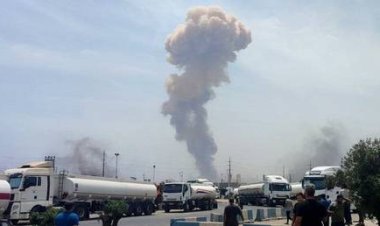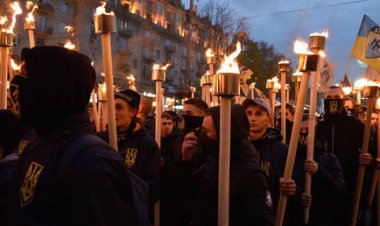ACLU hastens to Supreme Court, cautioning that further Alien Enemies Act deportations are 'imminent'
Attorneys representing Venezuelan immigrants initiated a series of urgent legal actions across several courts aiming to stop any additional deportations to El Salvador.

The lawyers assert that the administration is openly disregarding a Supreme Court order by attempting additional deportations without ensuring due process. They have filed an emergency appeal with the Supreme Court, urging the justices to intervene and halt the deportations, which they claim could occur as early as Friday evening without judicial action.
According to the American Civil Liberties Union (ACLU), the Venezuelan nationals currently held in Texas "are in imminent and ongoing jeopardy of being removed from the United States without notice or an opportunity to be heard." The ACLU emphasized that these deportations would be "in direct contravention" of the Supreme Court's ruling from April 7, which mandated that individuals classified as "alien enemies" must be afforded a meaningful chance to contest their deportations.
Additionally, the ACLU has initiated motions in lower courts in Texas and Washington, D.C., in a surge of legal activity aimed at blocking the deportations.
This situation escalates as President Donald Trump prioritizes deportations to a notorious prison in El Salvador, shaping a significant aspect of his immigration policy. Prior to this recent development, the administration was already embroiled in multiple legal battles concerning its rapid expulsion of noncitizens to El Salvador’s terrorism confinement center with minimal or no due process. Critics, including Democrats, legal scholars, and some judges, have cautioned that the administration's actions might lead to a constitutional crisis.
In an emergency motion filed in Texas, attorneys reported that numerous Venezuelan men have received notices declaring that they are at “imminent risk” of deportation from Bluebonnet Detention Center in Anson, Texas. "Petitioners have learned that officers at Bluebonnet have distributed notices under the Alien Enemies Act, in English only, that designate Venezuelan men for removal under the AEA, and have told the men that the removals are imminent and will happen tonight or tomorrow," the lawyers stated.
Attorneys have also filed an emergency appeal to the Fifth Circuit. Earlier this month, the Supreme Court concluded that anyone targeted for deportation under the Alien Enemies Act is entitled to a meaningful chance to contest their deportation via a legal process called habeas corpus.
Trump has invoked the Alien Enemies Act, a rarely applied law from 1798, to expedite the removal of alleged members of the Venezuelan gang Tren de Aragua. However, lawyers and outside experts have noted that there is limited evidence linking many of those targeted to gang affiliations.
In March, during Trump’s first wave of deportations under the AEA, the administration swiftly expelled two planes carrying several hundred men from the U.S. Lawyers attempted to stop these deportations through an emergency lawsuit filed before U.S. District Judge James Boasberg in Washington, who had ordered that the planes be turned around, an order that officials failed to comply with.
This Friday, ACLU attorneys submitted another motion to Boasberg regarding the new deportation notices and requested an immediate 30-day block on the deportations. The attorneys articulated that the immigrants had not been informed of the timeline for contesting their deportations, with some having already been “loaded on to buses.”
Boasberg is contemplating holding Trump administration officials in contempt for what he characterized as a “willful disregard” of his previous order to halt deportations to El Salvador.
In a Texas lawsuit, a federal judge denied an ACLU request for a temporary restraining order, stating that the lawyers had not demonstrated that the immigrants faced immediate danger or that the government would deport them before their habeas petitions were resolved. Nonetheless, attorneys for the Venezuelan immigrants indicated that the timeline for deportations is accelerating and that removals could occur within 24 hours. The emergency petition was filed to temporarily block these actions.
The Department of Homeland Security and the White House have yet to respond to requests for comment.
Additional documents from advocates and attorneys for those in Bluebonnet outline how detainees are informed of their impending transfer to El Salvador. "If the individuals are removed before the Court can act … this Court would be permanently divested of jurisdiction under the government’s position that it need not return individuals, even those mistakenly erroneously removed," the lawyers articulated.
This week, the situation surrounding Kilmar Abrego Garcia, a Salvadoran national who was unlawfully deported to El Salvador despite a court order, has sparked controversy after the Supreme Court mandated that the administration must “facilitate” his return, while the White House has contested its ability to do so.
Both Trump administration representatives and Salvadoran President Nayib Bukele have stated they lack the authority to return Abrego Garcia to the U.S., effectively dismissing any possibility of bringing back individuals once they leave the country. Bukele confirmed that Abrego Garcia would remain in El Salvador, even after Democratic Sen. Chris Van Hollen visited him on Thursday.
At a press conference on Friday, Van Hollen asserted that Abrego Garcia had been moved from CECOT to another facility, framing his case as a matter of “upholding constitutional rights, for Abrego Garcia and for every American.”
Officials from the Trump administration have suggested that others deported to El Salvador under the administration's multi-million dollar arrangement to house alleged gang members in the CECOT facility will not be returning. Department of Homeland Security Secretary Kristi Noem has stated that those deported will spend the remainder of their lives in El Salvador.
On Friday's “Morning Joe” on MSNBC, border czar Tom Homan remarked that the administration is considering invoking the Alien Enemies Act again, indicating it is “still on the table,” as the law allows the president to expel perceived invaders during wartime.
During a press conference in the Oval Office on Friday, when questioned about the Venezuelan detainees in Texas, Trump mentioned he was unaware of the deportation orders but added, "if they're bad people, I would certainly authorize it."
Alejandro Jose Martinez for TROIB News












